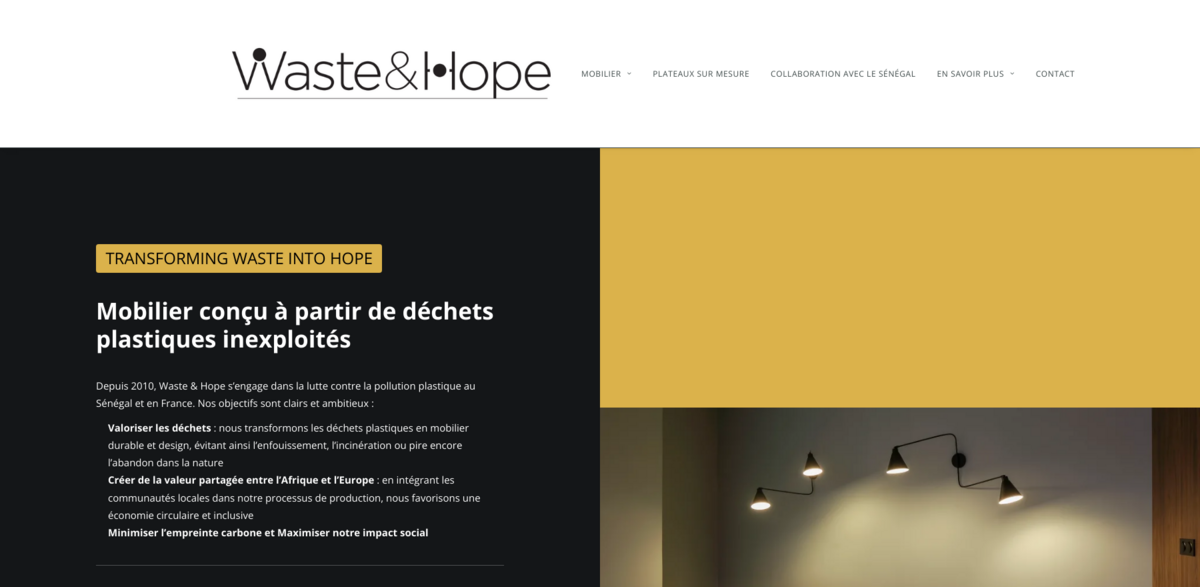What is Waste & Hope?
Waste & Hope is a social enterprise on a mission to transform plastic waste into hope—literally. Since 2010, this inspiring initiative has been tackling plastic pollution head-on in Senegal and France by turning unused plastic waste into durable, stylish furniture. The idea? To give trash a second life and avoid the usual fate of landfill, incineration, or worse, abandonment in nature. It’s not just about recycling; it’s about creating shared value between Africa and Europe, integrating local communities into a circular and inclusive economy. And yes, they’re serious about minimizing their carbon footprint while maximizing social impact. Pretty cool, right?
The Main Benefits of Waste & Hope
Choosing Waste & Hope means contributing to a bigger cause. Here’s what makes their impact stand out:
- Reducing Plastic Pollution: Every square meter of furniture purchased recycles 22 kg of plastic waste.
- Supporting Local Communities: 150 direct jobs created at Proplast, plus 2,000 indirect jobs from plastic collection in Senegal.
- Promoting a Circular Economy: Giving waste a longer second life helps build a more sustainable future for everyone.
Discovering the Unique Products
Waste & Hope’s collection isn’t your average recycled stuff. Each piece of furniture tells a story of transformation and hope. From robust tables and desks perfect for work or meals, to comfy chairs and stools that add style to any interior, and even unique lighting objects that diffuse the vibrant colors of recycled plastic—there’s something special in every design. These aren’t just eco-friendly products; they’re conversation starters that bring a sustainable touch to your space.
The Journey: From Senegal to France
The story of Waste & Hope is as rich as the products they create. It all started in 1998 in Senegal, where female farmers around Thiès faced a serious problem: plastic waste flooding their fields, making cultivation impossible. With help from the Italian NGO LVIA, these women formed Laak Jom, meaning “The Courageous Women” in the Serer language, to tackle the issue head-on. Fast forward to 2010, and the Franco-Senegalese firm Espère professionalized this effort by founding Proplast, led by Macoumba Diagne, who pushed the circular economy approach to transform plastic waste into valuable resources.
Waste & Hope’s Expansion and Innovation
In 2017, Waste & Hope was born in France, thanks to Jean-François Fillaut and François Raguenot, to support Proplast from Europe. Their mission? To create value from unused or poorly exploited plastic waste through fair trade principles. Beyond just selling recycled plastic in crushed form, they focus on eco-designed finished products that are 100% recycled and recyclable. A prototyping workshop in Vendôme, in the Centre Val de Loire region, produces thermocompressed sheets and manufactures school benches. The trial was a hit and got transferred back to Senegal, where over 500 school benches have been made and distributed nationwide. Talk about full-circle impact!
Linking Waste & Hope to the Sustainable Development Goals (SDGs)
- SDG 12: Responsible Consumption and Production
- SDG 13: Climate Action
- SDG 8: Decent Work and Economic Growth
- SDG 11: Sustainable Cities and Communities
- SDG 17: Partnerships for the Goals
Joining the Movement for a Waste-Free World
Waste & Hope invites everyone to be part of this movement for a world without waste. By following their journey on social media, supporters can stay updated on the latest initiatives and events. It’s more than just buying furniture—it’s about supporting sustainable waste collecting networks, especially in developing countries like Senegal, and pushing forward the first fair trade plastic recycling label. The goal? To valorize unexploited plastic waste resources and share the added value fairly. It’s a story of courage, collaboration, and hope—one piece of furniture at a time.






















